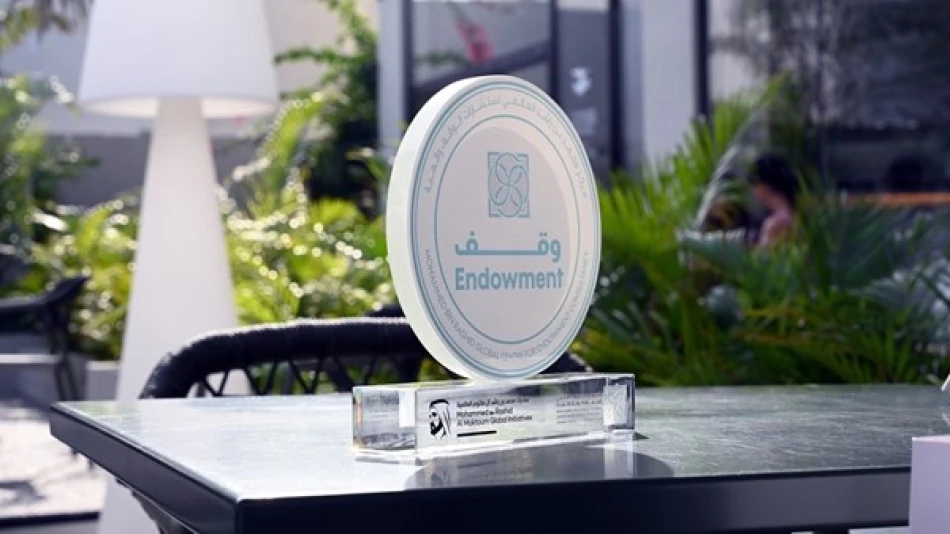
Dubai's Mohammed Bin Rashid Endowment Center Manages 10 Waqfs, Enhancing Quality of Life
Dubai Pioneers Islamic Endowment Innovation With 10 Groundbreaking Social Impact Programs
Dubai's Mohammed bin Rashid Global Centre for Endowment Consultancy has launched ten innovative waqf (Islamic endowment) programs that are reshaping how traditional charitable giving addresses modern social challenges. These initiatives, serving over 416,000 beneficiaries by end-2024, represent a strategic transformation of Islamic philanthropy into a sustainable development tool targeting healthcare, education, housing, and food security for low-income families.
Revolutionary Endowment Models Break Traditional Boundaries
The ten pioneering programs demonstrate how Dubai is modernizing centuries-old Islamic charitable practices. The flagship "Endowment Certificates" program marks the region's first charitable endowment allowing individuals and institutions to place funds in savings accounts, with returns automatically directed to specific causes like orphan support, healthcare, or education—ensuring perpetual giving without depleting principal capital.
Other breakthrough initiatives include the "Legal Consultation Endowment," where elite Emirati lawyers provide free legal advice to those unable to afford it, and "University Seat Endowments" offering academic opportunities to low-income students. These programs address critical gaps in social services while maintaining financial sustainability.
Market-Driven Philanthropy Meets Social Innovation
Several programs demonstrate sophisticated market integration. The "Real Estate Developer Endowment" incentivizes property developers to allocate units for financing diverse charitable activities, creating a self-sustaining funding mechanism tied to Dubai's robust real estate sector. Similarly, the "Hotel Room Endowment" designates hotel room revenues specifically for orphan support, linking tourism income to social welfare.
The "Restaurant Table Endowment" allows individuals to sponsor designated tables in restaurants for feeding the needy, while the recently launched "Dates Endowment" collects surplus dates for distribution alongside educational materials about UAE's palm cultivation heritage.
Technology-Enhanced Social Impact
The "Madrasah.com Initiative" provides digital education solutions for students from low-income families, reflecting Dubai's broader digital transformation strategy. This technological integration positions these endowments ahead of traditional charitable models in other Gulf states, which often rely on conventional distribution methods.
Strategic Positioning in Global Philanthropy Landscape
Dubai's approach contrasts sharply with Singapore's government-led social programs or the US foundation model. By embedding Islamic principles within modern financial structures, Dubai creates a unique hybrid that could influence philanthropic practices across the Muslim world's $2.4 trillion economy.
Ali Al Mutawa, Secretary-General of Dubai's Awqaf and Minors Affairs Foundation, emphasized that these innovative endowments translate leadership vision into practical community development partnerships. The model positions endowment institutions as government partners rather than mere charitable adjuncts.
Implications for Regional Development Models
These programs signal Dubai's ambition to become the global capital for humanitarian and endowment work, potentially attracting international Islamic finance institutions and impact investors. The success metrics—416,000 beneficiaries within a relatively short timeframe—suggest scalability that could influence policy frameworks across the Gulf Cooperation Council.
The integration of traditional waqf principles with contemporary social challenges creates a replicable model for other Muslim-majority nations seeking sustainable development financing outside conventional government or international aid channels. This positions Dubai at the forefront of Islamic social finance innovation, complementing its established role in Islamic banking and sukuk markets.
For investors and policymakers, these endowments demonstrate how religious charitable frameworks can generate measurable social returns while maintaining cultural authenticity—a critical factor for sustainable development in traditional societies undergoing rapid modernization.
Most Viewed News

 Layla Al Mansoori
Layla Al Mansoori






